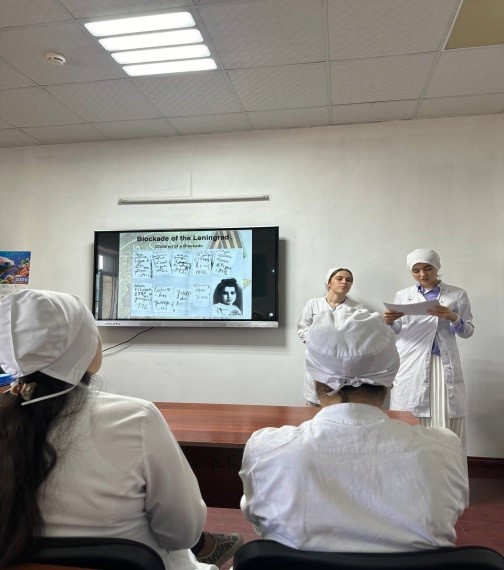MAY 9 - VICTORY DAY
8.05.2024 at the department of propaedeutics of children diseases assistant M.A. Rakhmatullaeva and Murodov G.Z. was holding an open lesson on the topic « May 9 - Victory Day ». The speakers of the presentation were students of the 3rd course 49 and 50 groups of the medical faculty Davlatova Dilafruz and Kurbonova Firuza. Content of the report: On June 22, 1941, fascist Germany attacked the Soviet Union without declaring war. The army and the population of the country were not ready for this. On the first day, 1,200 Soviet aircraft were destroyed. The Red Army was not motorized; the command staff, due to Stalin's repressions in the late 1930s, consisted mainly of inexperienced commanders. The Supreme Commander-in-Chief was at a loss all this time and did not address the Soviet people until July 3. Despite the heroism and self-sacrifice of Soviet soldiers and officers in the first weeks of the war, the enemy was not stopped. To the last fought heroes of the Brest fortress and Minsk, Kiev and Odessa, Leningrad and Stalingrad, Sevastopol and Novorossiysk, Kerch and Tula, Smolensk and Murmansk. The enemy advanced with heavy battles from the border Brest fortress to Smolensk, from Kiev to Tula and everywhere met heroic resistance. The enemy was fiercely repulsed under the city of Elney. Here for a while the unstoppable onslaught of the German hordes was suspended. Blockade of the Leningrad: Leningrad experienced the hardest days. 900 days and nights the city on the Neva was under siege. The enemy blocked all approaches to him, which made it impossible to bring food. In Leningrad, famine began. To fill empty stomachs, to drown out unparalleled suffering from hunger, the inhabitants resorted to various methods of finding food: catching rooks, fiercely hunting for the surviving cat or dog, from home medicine kits chosen everything that can be used in food: Castor, vaseline, glycerin; soup, jelly, made from joinery glue. In September 1941, the famous Road of Life began to function - a water route in summer and ice in winter, providing a connection between Leningrad and the country on Lake Ladoga. The final battle in the Great Patriotic War was the Battle of Berlin, or the Berlin Strategic Offensive, which took place from 16 April to 8 May 1945. On April 16, at 3 pm local time, aviation and artillery training began on the 1st Belarusian and 1st Ukrainian fronts. Finally, 143 searchlights were turned on, and the infantry, supported by tanks, attacked the enemy. Having met no strong resistance, it advanced 1.5-2 kilometers. But the closer our troops came, the stronger the enemy’s resistance grew. The forces of the 1st Ukrainian Front carried out a rapid maneuver on the exit to Berlin from the south and west. Fighting for the Reichstag continued until the morning of 1 May. At 6:30 am on 2 May, Berlin’s Chief of Defence, General Weidling of Artillery, surrendered and ordered the remnants of the Berlin garrison to cease resistance. On 9 May, at 0:43 by Moscow time, Field Marshal General Wilhelm Keitel, as well as representatives of the German Navy, who had authority from Denitz, signed the Act of Unconditional Surrender of Germany. The brilliantly conducted operation, coupled with the courage of Soviet soldiers and officers who fought to end the four-year nightmare of war, led to a legitimate outcome: Victory.
Department of propaedeutics of children's diseases

